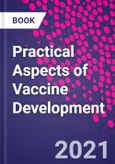Practical Aspects of Vaccine Development provides an academic and industry perspective on vaccine development and manufacturing. With the increasing complexity of vaccine products in development, there is a need for a comprehensive review of the current state of the industry and challenges being encountered. While formulation scientists working in biotherapeutic development may be familiar with proteins, vaccines present unique challenges. Vaccines include a wide range of components including proteins, polysaccharides, protein-polysaccharide conjugates, adjuvants, and more. The container closure system may also be unique, and the product may require freezing storage or lyophilization based on the stability of the vaccine components. Based on the route of delivery, novel technologies and devices may be required.
Covering formulation development, manufacture, and delivery considerations of vaccine production, this book is essential to formulation scientists, researchers in vaccine development throughout medical and life sciences, and advanced students.
Please Note: This is an On Demand product, delivery may take up to 11 working days after payment has been received.
Table of Contents
Section 1: Formulation Development1. Overview of vaccine antigens
Katherine Elizabeth Odneal
2. Overview of vaccine adjuvants
Mansoor M. Amiji, Rushit Lodaya, Sonia Gregory and Derek t. O'Hagan
3. Formulation considerations for Live attenuated vaccines
Lee Smith
4. Subunit based vaccines: Challenges in developing protein based vaccines
Charkes Middaugh and Salvador Fernando Ausar
5. Formulation development approaches and considerations for protein based vaccines
Malte Meppen and Daniela Stranges
6. DNA and RNA vaccines
Kanwal Gill, Leanne Minall and Aslin Rodriguez Nassif
7. Antigen-adjuvant formulation- Key considerations
Deep Bhattacharya, Aaron J. Latal, Vamsi Krishna Mudhivarthi and Chris Wiley II
8. Suspension Properties and Characterization of Aluminum-Adjuvanted Vaccines
Alex Langford
Section 2: Process Development
9. Effect of shipping stress on suspension vaccines
Jianxin Guo and Parag Kolhe
10. Developing control strategy for final dose concentration- Case study
Deep Bhattacharya and Parag Kolhe
11. Lyophilized vaccine development
Adora Padilla, Nicole Payton and Rushit Lodaya
Section 3: Delivery
12. Conventional and non-traditional delivery methods and routes of administration
Roberta Antonia Diotti, Giuseppe Andrea Sautto and Valeria Caputo








